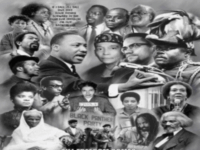 An argument can be made that African Americans have accomplished more than any similarly situated group in the history of the world. No other community, having endured centuries of enslavement, systematic exclusion, and legalized discrimination, has transformed its circumstance to such an extent and made contributions of such global magnitude. The African American experience is not only one of suffering but also of remarkable achievement that reshaped the culture, politics, and intellectual life of the United States and beyond.
An argument can be made that African Americans have accomplished more than any similarly situated group in the history of the world. No other community, having endured centuries of enslavement, systematic exclusion, and legalized discrimination, has transformed its circumstance to such an extent and made contributions of such global magnitude. The African American experience is not only one of suffering but also of remarkable achievement that reshaped the culture, politics, and intellectual life of the United States and beyond.
The survival and perseverance of African Americans in the face of slavery stand as a singular testament to human resilience. Enslaved people were stripped of language, culture, and kinship systems, yet they created new cultural forms—spirituals, folktales, religious traditions—that not only sustained them but also influenced American identity. Out of dehumanization emerged creativity, solidarity, and hope, laying the foundation for later triumphs.
The struggle for freedom and equality produced one of the world’s most consequential social justice movements. The abolition of slavery, Reconstruction politics, and the modern Civil Rights Movement represent waves of organized resistance that altered the trajectory of a nation. Figures like Frederick Douglass, Sojourner Truth, W.E.B. Du Bois, Martin Luther King Jr., Malcolm X, and countless unnamed activists did not simply fight for the rights of African Americans but redefined democracy itself. Their efforts expanded the meaning of citizenship, liberty, and justice in ways that influenced freedom struggles globally.
African Americans reshaped American culture in ways unmatched by any other marginalized group. From the birth of jazz, blues, gospel, and hip-hop to innovations in dance, theater, and visual art, African American creativity has defined cultural modernity. Writers such as Zora Neale Hurston, James Baldwin, Toni Morrison, and Maya Angelou gave voice to universal human experiences while remaining rooted in the Black experience. This cultural renaissance has not only enriched the United States but has reverberated across the world.
African Americans also made critical contributions in science, politics, and sports, despite systemic barriers. Pioneers such as George Washington Carver in agriculture, Katherine Johnson and other “Hidden Figures” in space exploration, Barack Obama as the nation’s first Black president, and athletes like Jackie Robinson and Serena Williams demonstrate achievement at the highest levels of human endeavor. These accomplishments often came under conditions designed to prevent them, highlighting the extraordinary nature of their success.
And above all, the sheer resilience of African Americans — the survival and thriving of a people after slavery and Jim Crow — demonstrates that white supremacy cannot fully succeed. If its purpose is to erase or permanently subordinate Black life, then the enduring vitality of African American culture, identity, and achievement is its most profound defeat.